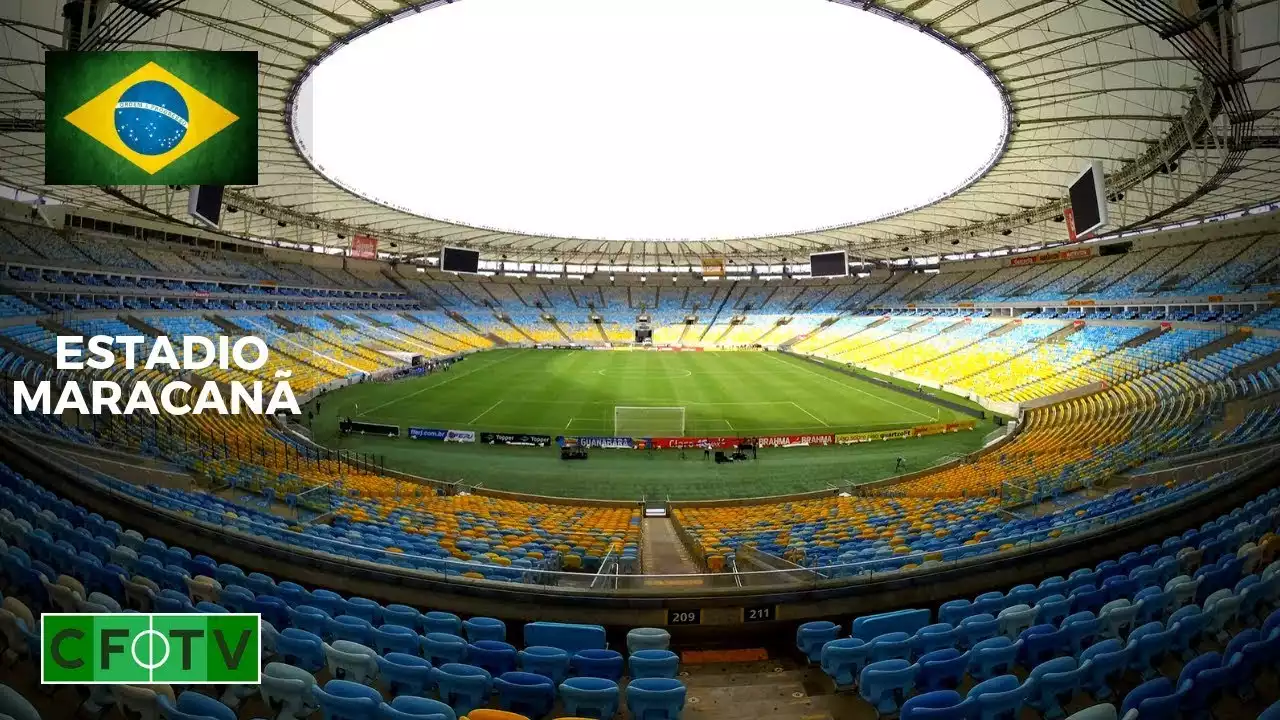Attention
Attention soccer enthusiasts! Get ready to explore the fascinating world of stadiums that have made history by hosting both the Men's and Women's World Cups. These iconic arenas have witnessed unforgettable moments and captivating performances from some of the greatest soccer legends.
From the colossal Maracanã Stadium in Brazil to the modern marvel of the Stade de France, these venues have provided the stage for intense matches and dramatic victories. Steeped in tradition and infused with the electric atmosphere of global competition, these stadiums have become hallowed ground for soccer fans around the world.
Join us on a virtual tour as we delve into the rich history of these remarkable stadiums. Discover the stories behind their construction, the famous matches held within their walls, and the legacies that continue to influence the world of soccer.
Whether you're a die-hard fan or a casual observer, this article will take you on an exhilarating journey through the stadiums that have brought joy, tears, and memories that will last a lifetime. So grab your virtual ticket and get ready to experience the magic of these dual-gender World Cup arenas.
Importance of hosting the World Cup
The FIFA World Cup is the most prestigious tournament in international soccer, bringing together teams from around the globe to compete for the ultimate prize. The honor of hosting a World Cup is bestowed upon a select few nations, and with it comes the responsibility of providing world-class stadiums to showcase the beautiful game.
Hosting the World Cup not only brings immense pride to the host nation but also has significant economic and cultural benefits. The tournament attracts millions of fans from all over the world, boosting tourism and generating revenue for local businesses. It also provides an opportunity for the host nation to showcase its culture, infrastructure, and hospitality on a global stage.
Moreover, hosting the World Cup has the power to unite people and transcend boundaries. It brings together individuals from diverse backgrounds, fostering a sense of camaraderie and mutual respect. The tournament serves as a catalyst for social cohesion and promotes the values of fair play, teamwork, and sportsmanship.
Maracanã Stadium - Rio de Janeiro, Brazil
One of the most iconic stadiums in the world, the Maracanã Stadium in Rio de Janeiro, Brazil, has witnessed countless historic moments in both men's and women's soccer. With a seating capacity of over 74,000, it is the largest stadium in Brazil and has been a focal point for the sport in the country.
The construction of the Maracanã Stadium began in 1948 and was completed in time for the 1950 FIFA World Cup. The tournament's final match, known as the "Maracanazo," saw Uruguay defeat Brazil in front of a record-breaking crowd of 199,854 spectators. This match is still considered one of the biggest upsets in World Cup history.
In 2014, the Maracanã Stadium once again hosted the World Cup, this time with the addition of the Women's World Cup matches. The stadium was the venue for the final match between Germany and Argentina, which saw Germany claim their fourth World Cup title. The inclusion of the Women's World Cup in the Maracanã Stadium further solidified its status as one of the most historic and iconic soccer arenas.
Rose Bowl Stadium - Pasadena, United States
The Rose Bowl Stadium in Pasadena, United States, is another legendary venue that has hosted both the Men's and Women's World Cups. Located in the picturesque Arroyo Seco, the stadium has a seating capacity of over 90,000 and is known for its iconic architecture and natural grass playing surface.
The Rose Bowl Stadium first hosted the Men's World Cup in 1994, making history as the first outdoor venue in the United States to host the tournament. The final match between Brazil and Italy drew a crowd of over 94,000 spectators and is still considered one of the most memorable World Cup finals.
In 1999, the Rose Bowl Stadium became the stage for the Women's World Cup final, where the United States defeated China in a thrilling penalty shootout. The match, which drew a record-breaking crowd of 90,185, is often credited with sparking a surge in interest and participation in women's soccer in the United States.
Stade de France - Saint-Denis, France
The Stade de France in Saint-Denis, France, is a modern marvel that has hosted both the Men's and Women's World Cups. Built for the 1998 FIFA World Cup, the stadium is the largest in France and has a seating capacity of over 80,000.
The Stade de France was the venue for the Men's World Cup final in 1998, where France defeated Brazil to win their first-ever World Cup title. The victory sparked celebrations across the country and cemented the stadium's place in French soccer history.
In 2019, the Stade de France was once again in the spotlight as it hosted the Women's World Cup final. The match between the United States and the Netherlands drew a crowd of over 57,000 and showcased the growing popularity and success of women's soccer on a global scale.
Estadio Azteca - Mexico City, Mexico
The Estadio Azteca in Mexico City, Mexico, is a legendary stadium that has witnessed some of the most memorable moments in World Cup history. With a seating capacity of over 87,000, it is the largest stadium in Mexico and has a rich soccer heritage.
The Estadio Azteca first hosted the Men's World Cup in 1970, becoming the stage for the iconic "Game of the Century" between Italy and West Germany. The match, which ended in a 4-3 victory for Italy, is considered one of the greatest matches in World Cup history.
In 1971, the Estadio Azteca became the venue for the inaugural Women's World Cup, making it the first stadium to host both men's and women's tournaments. The tournament was a milestone for women's soccer and laid the foundation for future growth and development.
Commonwealth Stadium - Edmonton, Canada
Located in Edmonton, Canada, the Commonwealth Stadium is a versatile venue that has hosted both the Men's and Women's World Cups. With a seating capacity of over 56,000, it is one of the largest stadiums in Canada and has a unique design that allows for a variety of sporting events.
The Commonwealth Stadium first hosted the Men's World Cup in 1986, providing a memorable setting for matches that showcased the talent and passion of the participating nations. The tournament left a lasting impact on Canadian soccer and inspired a new generation of players and fans.
In 2002, the Commonwealth Stadium became the venue for the Women's World Cup, further solidifying its place in soccer history. The tournament attracted record-breaking crowds and showcased the growing popularity and skill level of women's soccer on a global scale.
The significance of these stadiums in the history of World Cups
The stadiums that have hosted both the Men's and Women's World Cups hold a special place in the history of soccer. They have provided the stage for unforgettable matches, historic victories, and moments of pure sporting brilliance.
These stadiums represent more than just brick and mortar; they embody the spirit of the game and the passion of the fans. They have become symbols of national pride, cultural heritage, and the power of sport to unite people from all walks of life.
As the world of soccer continues to evolve, we can expect to see more stadiums join the prestigious list of dual-gender World Cup hosts. The future holds endless possibilities, and we eagerly await the next chapter in this captivating journey.
So, whether you're a fan of the Maracanã Stadium, the Rose Bowl Stadium, the Stade de France, the Estadio Azteca, or the Commonwealth Stadium, one thing is for certain - these stadiums will forever hold a special place in the hearts of soccer fans around the world.
Additional stadiums that may host both Men's and Women's World Cups in the future
As the popularity of women's soccer continues to soar, there is a growing demand for more stadiums to host both the Men's and Women's World Cups. Several stadiums have already expressed interest in hosting both tournaments in the future, including:
1. Wembley Stadium - London, England: With its rich history and iconic status, Wembley Stadium is a prime candidate to host both the Men's and Women's World Cups. The stadium has a seating capacity of over 90,000 and has previously hosted the finals of both tournaments.
2. Allianz Arena - Munich, Germany: One of the most modern and technologically advanced stadiums in the world, the Allianz Arena is a potential host for future dual-gender World Cups. The stadium's unique lighting system allows it to change colors to match the teams playing, creating a visually stunning experience for fans.
3. Estadio Santiago Bernabeu - Madrid, Spain: Home to one of the most successful clubs in the world, Real Madrid, the Estadio Santiago Bernabeu has the capacity and infrastructure to host both the Men's and Women's World Cups. The stadium's rich history and vibrant atmosphere make it an ideal venue for global soccer events.










